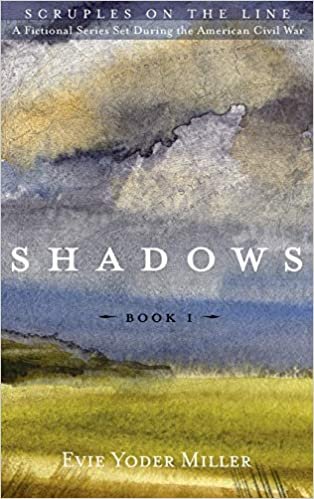Review: Evie Yoder Miller’s Shadows: Scruples on the Line
Shadows: Scruples on the Line is a work of historical fiction in a journal format. Five nineteenth century American pacifists speak in turn to tell how the Civil War is affecting their lives.
The first challenge is conscription. At the time, there was no allowance for conscientious objectors. Esther, in the Shenandoah Valley, laments, “No place to hide. Only a half cellar. If the men desert, they face court martial. Or worse. They have to report. But to go against conscience? How can any authority think it right?”
The resistance to violence leads to harassment and humiliation. Esther’s sons are compelled to haul stores of goods the Confederate Army has captured from the Union Army, and make shoes for the soldiers, because “they were worthless to train to shoot.” J Fretz of Chicago laments, “Last week, two comely women made clear to Joe and me, if we want to be men, we must go to war.”
This situation creates more temptations to compromise in other areas of obedience to God’s commands. David, though he is exempt from conscription due to his age, cannot risk visiting a friend who has been jailed as a deserter. He longs to do a Biblical thing: visit a brother in prison. His wife dissuades him, but his conscience troubles him. He is haunted by the words of Christ: “I was … in prison, and ye visited me not.”
Pacifists on both sides of the conflict suffered privations and violence along with non-pacifists. David’s horse is commandeered by the Confederate Army. When soldiers take his grain and cruelly mock his terrified wife, he remarks on the state of anarchy, “These bushwackers stop anyone on the road, inquire as to your business. No authority whatsoever…But a man with a pistol commands attention.”
Miller’s work focuses on the cost of the war to those who refused to fight or even take a side. The conflict drove a wedge between people: not only between Northerners and Southerners, but also between these two camps and the dissenters among them. David says it is hard “to be misunderstood, to be looked on by neighbors as traitors –condemned as Union!-- when we do not fall in line with popular thought on slavery and warfare.” He notes that the more people die for the rebel cause, the more anxious the survivors are to fix blame for their losses on those who refuse to fight.
This idea of being judged by others because one does not fall in line with popular thought feels freshly relevant in the twenty-first century.
Miller did research to ensure that the trials experienced by her characters were common amongst the Amish, Mennonite, and German Baptist communities at the time, then detailed the character’s thoughts and feelings in a first-person account. In doing so, she gains the benefit of exploring the characters’ motives, surely an important goal in such a work. Of course, there are limitations to using a first person narrator, most notably the fact that it gives the reader a single perspective (in this case, five perspectives from individuals with a shared commitment to nonviolence).
In addition to the limitations set by using first person voices, because each chapter in Shadows reads like a diary entry, readers don’t have the benefit of hearing from a narrator looking back on his whole life and ruminating on lessons learned. Each time the character speaks, he or she is referring only to the recent past. This makes the reader feel that he or she is experiencing the characters’ lives more or less in “real time.” On the other hand, because the characters are recording their experiences as they happen, readers can witness the interior evolution of the characters by checking in on them periodically.
While some of the characters seem to change very little, the more interesting ones do evolve. J Fretz, for whom the Mennonite religion seems more of a cultural identity than a matter of conscience, struggles with the personal and moral cost of “getting ahead in business.” He has cut ties with his conservative sweetheart in his home town and is striving to achieve wealth and status, but feels conflicted. I found myself hoping he would give up the hustle and bustle in Chicago and marry the girl back home.
Each entry is written in standard English, but dialogue is rendered in a strange sort of choppy English, which took me some to get used to. For example, “The first battle, the hardest, covered in smoke. Hard to see. The noise. Minnie balls sizzling past.” I can only assume that this is the way people whose first language is Pennsylvania Dutch spoke English in the mid-nineteenth century.
If you are an ethicist, a Civil War buff, a religion buff, a member of a pacifist sect of Christianity, a thoughtful Christian, or a lover of novels in a journal format, you may enjoy Evie Yoder Miller’s Shadows: Scruples on the Line. It is the first book in a three-volume series.
